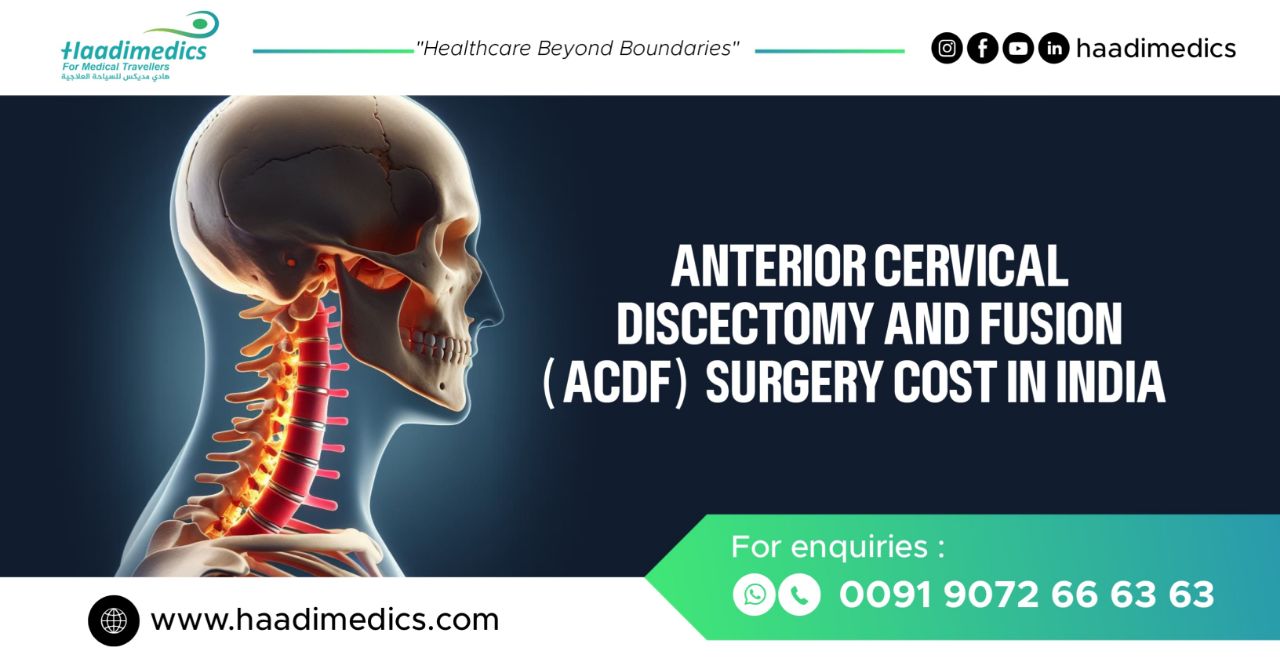India boasts a robust healthcare infrastructure and a pool of skilled surgeons specializing in spinal surgeries. With world-class hospitals equipped with cutting-edge technology, India has garnered recognition for its success in performing ACDF surgeries with high precision and favorable outcomes. Patients from across the globe choose India for its affordability, expertise, and quality of care in spinal procedures.
What is Anterior Cervical Discectomy and Fusion (ACDF)?
Anterior Cervical Discectomy and Fusion (ACDF) is a surgical procedure aimed at relieving pressure on the spinal cord or nerve roots in the neck by removing damaged or herniated discs. The procedure involves accessing the cervical spine through the front of the neck (anterior approach), removing the affected disc, and fusing adjacent vertebrae to stabilize the spine.
Why is it done?
ACDF surgery is performed to alleviate symptoms associated with cervical disc herniation, degenerative disc disease, spinal stenosis, or cervical spine fractures. By decompressing the spinal cord and nerve roots and stabilizing the spine, ACDF aims to relieve neck pain, arm pain, numbness, weakness, and other neurological symptoms.
Risks
While ACDF surgery is generally safe, it carries certain risks and potential complications, including infection, bleeding, damage to nerves or blood vessels, hoarseness, difficulty swallowing (dysphagia), voice changes, and failure of bone fusion (pseudarthrosis). Patients should discuss these risks with their surgeon and follow pre-operative instructions to minimize complications.
Preparation
Preparation for ACDF surgery involves a thorough evaluation by a spine surgeon, including physical examination and imaging studies (X-rays, MRI, CT scans) to assess the cervical spine's condition. Patients may be advised to stop certain medications, such as blood thinners, prior to surgery and to refrain from eating or drinking for a specified period before the procedure.
Procedures
During ACDF surgery, the patient is placed under general anesthesia to ensure comfort and immobility. The surgeon makes a small incision in the front of the neck, gently moves aside the soft tissues and structures, and accesses the affected disc(s). The damaged disc material is removed, and a bone graft or artificial spacer is inserted to maintain disc height and promote fusion between adjacent vertebrae. Metal plates, screws, or cages may be used to stabilize the spine during the fusion process. After that, the wound is closed, and the patient is under constant observation as they heal.
Best Hospitals in India
- Fortis Memorial Research Institute, Gurgaon
- Indian Spinal Injuries Center, New Delhi
- Indraprastha Apollo Hospital, New Delhi
- Apollo Hospitals, Greams Road, Chennai
- Manipal Hospital (Old Airport Road) Bangalore
- Kokilaben Dhirubhai Ambani Hospital, Mumbai
- AMRI Hospital, Kolkata (Dhakuria)
Best Doctors in India for ACFD Surgery
- Dr. Hitesh Garg
- Dr. SK Rajan
- Dr. Sandeep Vaishya
- Dr. SK Hegde
- Dr. Anand Dank
- Dr. S Karunakaran
Cost Comparison
India – USD 2100
Turkey – USD 4800
Thailand – USD 4000
Germany – USD 14400
USA – USD 21000
FAQ
1. How long does ACDF surgery typically take?
ACDF surgery duration varies depending on the number of levels involved and complexity but generally lasts between 1 to 3 hours.
2. Will I need to wear a neck brace after ACDF surgery?
A neck brace may be prescribed to support the neck and facilitate healing, especially during the initial recovery period. Your surgeon will provide guidance on the duration and usage of the neck brace.
3. When can I expect to return to normal activities after ACDF surgery?
The timeline for returning to normal activities varies for each patient but typically ranges from a few weeks to several months.
4. Can I drive after ACDF surgery?
Patients are typically advised to refrain from driving until cleared by their surgeon, usually around 4 to 6 weeks post-surgery or when they no longer need pain medications.
5. Will I need physical therapy after ACDF surgery?
Physical therapy may be recommended to improve neck strength, flexibility, and range of motion. Your surgeon will determine the appropriate timing and duration of physical therapy based on your individual needs.
6. Can I undergo MRI scans after ACDF surgery?
Newer implants and devices used in ACDF surgery are MRI-compatible, but it's essential to inform healthcare providers about your surgical history before undergoing any imaging procedures.
7. What are the signs of complications after ACDF surgery?
Signs of complications may include worsening pain, swelling, redness or drainage at the incision site, difficulty swallowing, hoarseness, weakness, or numbness in the arms or legs.
8. Will I need to take medications after ACDF surgery?
Your surgeon may prescribe medications to manage pain, reduce inflammation, prevent infection, and promote bone healing. It's essential to follow your prescribed medication regimen and report any side effects to your healthcare provider.
9. Are there any dietary restrictions after ACDF surgery?
Patients may be advised to follow a soft diet initially to facilitate swallowing and reduce strain on the neck. Your surgeon may provide specific dietary guidelines based on your individual needs.
10. Will I need to undergo follow-up appointments after ACDF surgery?
Follow-up appointments are essential for monitoring your recovery progress, assessing healing, and addressing any concerns or questions you may have. Your surgeon will schedule follow-up appointments as needed and provide instructions for post-operative care.


Comments